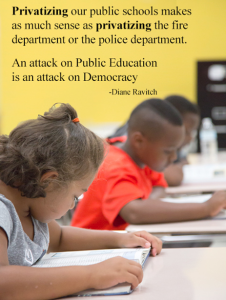 Given that education consistently ranks among the top issues for voters in most public opinion polls, with the vast majority (82%) of parents of school-aged children reporting that they are either “somewhat” or “completely satisfied” with their child’s education, one could be forgiven for being flummoxed by the near-absence of questions about teachers, schools, or education in general at any of the Democratic presidential debates thus far.
Given that education consistently ranks among the top issues for voters in most public opinion polls, with the vast majority (82%) of parents of school-aged children reporting that they are either “somewhat” or “completely satisfied” with their child’s education, one could be forgiven for being flummoxed by the near-absence of questions about teachers, schools, or education in general at any of the Democratic presidential debates thus far.
And while each of the candidates would likely claim that education is “very important” to them, the silence of most of these candidates on matters of education policy has been deafening. Only two of the candidates (Bernie Sanders and Elizabeth Warren) have released anything resembling a coherent education plan, although no one should be surprised if some of the others use this opportunity to unveil plans of their own in front of what is sure to be an appreciative, if somewhat wary audience.
Which makes Saturday’s “Public Education Forum” in Pittsburgh more of a mystery at this point than anything else.
That said, the event’s organizers (Alliance for Educational Justice, American Federation of State, County and Municipal Employees, American Federation of Teachers, Center for Popular Democracy Action, Journey for Justice Alliance, NAACP, National Education Association, Network for Public Education, Opportunity to Learn Action Fund, Schott Foundation for Public Education, Service Employees International Union, Voto Latino) deserve a ton of credit for holding a town hall that will force the candidates to focus on education, if only for a day.
For anyone who works in education, this forum promises to offer a glimpse into the minds of these candidates, and an opportunity for each candidate to make their case that they are the right person to halt the assault on our children, teachers, and schools that’s been carried out by Secretary of Education Betsy DeVos over the last 3 years.
Doing so will require candidates to decide which path to take:
- Will they join the relatively recent, and long overdue movement away from charter schools and the damage done by the obsession with standardized testing that characterized both the Bush and Obama administrations?
- Or double down on that failed “accountability agenda”, and push for an expansion of federal funding for charters, a commitment to high-stakes testing, and support for more “school choice” and voucher programs in an attempt to garner financial backing from the hedge fund managers and investment bankers who favor these reforms?
It’s a decision not without its potential risks. A number of the candidates (The Killer B’s: Michael Bennet, Joe Biden, Cory Booker, Pete Buttigieg) have ties of varying strengths to the charter and financial industries–two sectors whose interests are intertwined in complicated and problematic ways–and pivoting away now could mean losing out on that delicious reformy cash flow.
Look for these candidates to try to thread an increasingly narrow needle, expressing their support for “high quality public schools” (code for charters), “educational equity” (code for school choice), “innovative teaching strategies” (code for online and virtual schooling), and cracking down on “for-profit charter schools” (a distinction without a difference); while at the same time attempting to appeal to teachers by calling for higher salaries and better working conditions. It’s a tricky gambit, and depends on a general lack of awareness among the voting public when it comes to public education.
In other words, it’s worked so far.
As for the remaining candidates, Sanders and Warren have already made their education plans public, so it’s really a chance for Amy Klobuchar and Tom Steyer to convince the audience of two things: they care about education, and they’ve thought about what they’d do about education if they happened to become president.
Look for Klobuchar to demonstrate her empathy for the plight of teachers (her mother taught second grade until retiring at 70, and her husband is a law professor), while forwarding a rather tepid approach to a range of education policy issues that’s largely devoid of specifics:
- making higher education “more affordable”
- “promoting” early childhood education
- reducing the “achievement gap”
- “supporting” our teachers
Much of Klobuchar’s ed policy approach consists of tweaks and tinkering (stopping increases in student loan rates, refinancing loans at lower rates, increasing Pell grants, helping students with loan repayments, tuition-free community colleges), while holding the line on a good chunk of the accountability agenda (supporting national testing standards, year-round schools, increased funding for STEM programs, supporting the federal Race to the Top initiative).
To break out of the pack and earn the support of the nation’s teachers is going to require more than trotting out watered-down approximations of other candidates’ plans and vague platitudes about the “dignity of work” at this point. Education advocates are looking for bold leadership and a strong repudiation of the destructive policies of the DeVos/Trump administration.
So what would that look like?
- a return to the traditional Democratic position of strong support for labor, including teachers unions–with both the AFT and the NEA serving as sponsors for this event, this should be a no-brainer–and a pledge to oppose “right to work” legislation at state and federal levels
- a national moratorium on the creation of new charter schools, and a clear call for increased accountability measures for existing charters, putting an end to tactics like “co-location,” “creaming,” and expelling “hard to teach” students after “count day”
- require that all charter schools be governed by elected school boards made up of members of the communities in which they are located, and putting an end to “appointed” boards that do not represent the citizens
- the elimination of federal funding for alternative teacher certification programs, like “Teach for America,” “Teachers of Tomorrow,” and the “Relay Graduate School of Education”
- a clear repudiation of federal support for “school choice” and private school voucher initiatives
- developing universal child-care and early childhood education centers and programs in all public school districts
- restoring music, art, PE, and media teaching positions to all public schools, and increased funding for additional school psychologists, nurses, counselors, social workers, and other important support staff
- federal dollars to repair or replace crumbling buildings and facilities in our nation’s urban centers as well as funds to maintain and improve school facilities nationwide
- establishing reasonable class-size limits in all schools, at all levels
- the elimination of high-stakes teacher evaluation systems based on measures like VAM (value-added modeling) which have been shown to be statistically invalid and inappropriate for use in schools
- getting rid of standardized testing, and putting a halt to the harvesting of data that testing companies collect from our children
- giving teachers more autonomy and agency in developing the policies that govern classroom curricula and teaching practice
- rejecting calls for arming teachers and other school personnel, instead marshaling the resources of the federal government to enact reasonable gun regulations to insure the safety of all children and school personnel
The likelihood of any of the persons on the stage standing up and speaking out for any of these policy positions on Saturday is probably between slim and none. But any candidate with the vision, integrity, and courage to do so would find her or himself immediately acclaimed as the champion of the country’s 3.2 million public school teachers, and propelled to the top of the presidential field.
And what a refreshing change that would be: an “education president” who actually believes in public education, and is willing to support our nation’s children, teachers, and schools.
—
If you want to find out how accurate these predictions turn out to be, please follow Chris Savage (@Eclectablog) and me (@mrobmsu) on Twitter as we report from Pittsburgh on Saturday.




